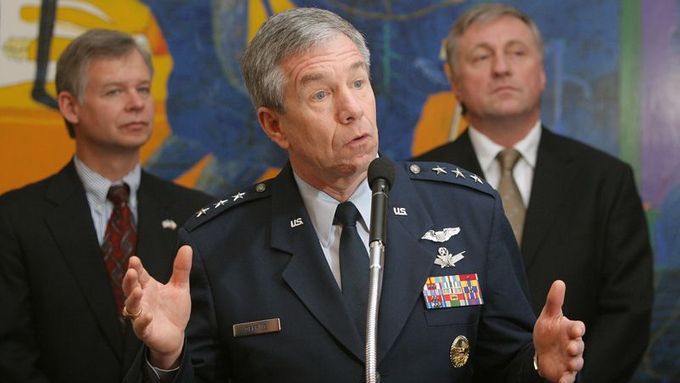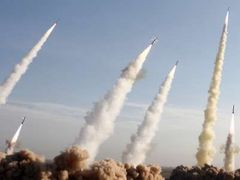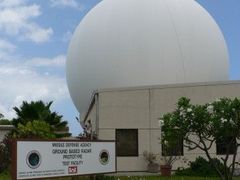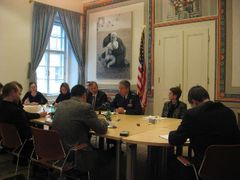Prague - Speaking with the eloquence and urgency of a travelling salesman, which is what he really was during his second visit to Prague over the last several months, General Henry Obering, head of Pentagon's Missile Defense Agency (MDA), once again made a case for the proposed US radar on Czech soil.
"There is a threat that looks very similar to one that we had seen before in the case of North Korea and we are concerned. I am talking about an evolving missile threat from Iran which is continuing to develop ballistic missiles with an increasing range," said Obering on Wednesday during a roundtable with a group of Czech journalists at the American embassy in Prague.
Iran still the main threat
The man, whose job it is to oversee the ongoing expansion of the American anti-missile shield to Europe and other parts of the world, made it clear, much like President Bush himself, that he did not consider it opportune to let the guard down despite the recent National Intelligence Estimate on Iran which seemed to discard the widely held notion that Teheran was within the reach of developing its own nuclear weapon.
"Even conventional warhead put on a long-range ballistic missile, could cause serious trouble," he said and explained that if Prague was to be hit by one such bomb, the effects would not differ much from the 9/11 attacks on the World Trade Center in New York.
Should it be nuclear, tens of thousands of people would die, and general Obering certainly did not put it past Mr. Ahmadinejad's regime and its unpredictable designs.
"We believe that this is a threat that needs to be addressed, and what is most disconcerting is that this is a threat which historically there has not been a defense against. In fact that's why these threats continue to proliferate," he said before delivering the ultimate slogan for the product he has come to sell.
"Today that has changed. We have the defense, we have the capability and we have the technology. And it's important that we extend protection in defensive coverage outside of the United States to our allies and our friends in European region."
"No risks whatsoever"
Mr. Obering was quick to stress that there has been "a tremendous progress" in the deployment and the testing of the system: "We have not had a major system failure or even a hiccup since February 2005, so almost three years, and that in a very robust testing program."
Besides, said "Mr. Umbrella", the system can be fully integrated into the NATO architecture, something the junior members of the Czech coalition government have repeatedly set as a pre-condition for their support.
Another evergreen of the radar bashers, its alleged health and environmental risks, was also swiftly brushed aside by the general:
"The radar that we are proposing (in the Czech Republic) is already in operation. It has been in operation for almost nine years in the south Pacific on a very small island of Kwajalin that has a significant population density. It has been operated very safely without any incidents and there is absolutely no reason to be worried about any environmental effects from this radar."
"And you'll make money off of it"
So where's the catch, the street savvy costumer might want to ask. Apparently, there is none Or at least the journalists were told so by the MDA head.
Besides, there is now the prospect of an added bonus in the form of potential economic benefits, if the Czech industry can pull itself together and find a way of supplying whatever the future base in Brdy might need.
General Obering kicked off a seminar on Wednesday which was meant to look at the cooperation between the US industry and the Czech industry as relates to the needs and technological capabilities. "And I think it's off to a good start," he said, painting a prospect of hundreds of millions dollars, earmarked for the base in the years 2009-2013, to find their way into the Czech pockets.
"This is just a beginning, I believe, of a more robust collaboration between the United States and the Czech Republic and other NATO partners in missile defense," he then said, making it sound like the deal is already done, which may very well be true, as suggested recently by the Czech Minister of Foreign Affairs Karel Schwarzenberg who believes the negotiations could be over and the agreements signed by the end of February.
EDITORIAL NOTE TO THE READER: To get a less rosy view of the American missile defense system and the potential downsides of the Czech Republic's proposed participation in it, read an interview with an expert and advisor of the Washington-based Center for Defense Information, former Undersecretary of Defense during the Clinton administration, Philip Coyle, who spoke to Aktuálně.cz earlier this week. We will publish it later today or tomorrow.



